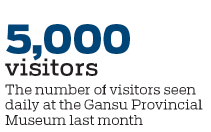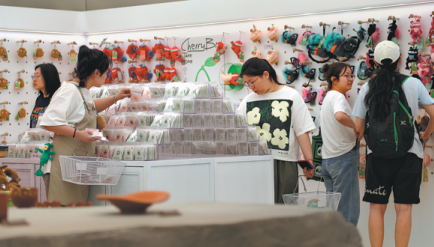

Visitors browse for souvenirs at the art and life gallery in the Gansu Provincial Museum in Lanzhou, Gansu province, on June 9.
LANZHOU — Imagine yourself in a well-lit cave, sinking deeply into a sofa and leafing through a magazine. Beside you is a cup of freshly brewed coffee and a pastry shaped like a millennia-old painted pottery jar.
The art and life gallery affiliated with the Gansu Provincial Museum in Northwest China can give you that kind of experience. Integrating artifacts, art, cuisine and books, this gallery has been a magnet for young people since it officially opened recently.
Across China, museums are opening themed cafes and galleries that represent a perfect fusion of historical profundity, sheer ingenuity and relaxed vibes, embodying a lifestyle pursued by the contemporary young generation. "The themed cafes and galleries meet the demand of the young people for a new type of comprehensive cultural space and diverse lifestyles," said Cui Youxin, head of the cultural creative center at the Gansu Provincial Museum and a member of the "post-90s" generation.
In recent years, museum-themed cafes and stores have mushroomed across China, gaining popularity among the younger generation. The Shanghai History Museum, for instance, opened a coffee shop adorned with historical items and art, and the Shenyang Palace Museum in Liaoning province opened a cafe promoting the Qing Dynasty (1644-1911) culture.
The new shops reflect the vitality of China's cultural and creative industry. According to a report by Zhiyan Consulting, the value of China's cultural and creative products reached 122.2 billion yuan ($16.81 billion) last year, a year-on-year increase of 13.09 percent.
Over nearly a decade, the cultural creative center at Gansu Provincial Museum has developed around 1,000 products based on artifacts in the museum, with one plush toy modeled after the bronze galloping horse proving to be a runaway success since its launch in 2022, raking in 7 million yuan by the end of last year for the museum.
Cui noted that the popularity of cultural and creative products has attracted many young people to the museum, inspiring the team to create a composite cultural space that better aligns with the consumption preferences of today's youth. "It was like building a dream; everyone contributed their creativity and ideas," Cui said.
Since the art and life gallery's trial operation in early June, the museum has seen at least 5,000 visitors daily, with many cultural and creative products selling out as soon as they hit the shelves.
Li Xingyue, a high school graduate, was excited while visiting the gallery. "The gallery surprised me, and the plush toys are just like the Chinese version of Jellycat (a British toy brand)," Li said.
Shi Ce, deputy curator of the museum, said that growing public demand for spiritual and cultural advancement is driving museums to continuously make innovations, allowing them to tap into cultural creativity to cater to the younger generation. "The significance of museums has been enriched as they resonate with more Chinese young people," Shi said.

